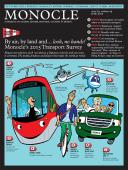
Issue 84
By air, by land and… look, no hands! Monocle’s 2015 Transport Survey. Elegant two-wheelers, sleek run-abouts, a Japanese mini-jet and cute ways to commute. The people, products and players that make the world go round
In This Issue
Oops! No content was found.
Looks like we no longer have content for the page you're on. Perhaps try a search?
Return Home

